Treatment with the help of the patient’s own information
in the BICOM® mobile VET bioresonance device
In contrast to other “frequency therapy devices”, BICOM® bioresonance is a method that is highly individual and perfectly tailored to the needs of the patient through the use of the patient’s own information and the possibility of testing specific wave patterns for resonance.
The patient’s own pathological and physiological information is recorded using special applicators and fed into the BICOM® mobile VET.
Depending on the therapy program, the specific wave pattern as a carrier of information is amplified, weakened or inverted and transmitted back to the patient in modulated form, which means that the transmission of information changes in clarity depending on the modulation or it disappears completely.
The treatment signals continuously adapt to the changing pathological situation of the patient. As the therapy progresses, the body’s ability to regulate is reactivated.
Find out more about this topic at our regular events. Together with veterinarians and animal naturopaths, we offer various face-to-face and online events .
The BICOM® bioresonance method is a cause-oriented, holistic treatment concept. It can narrow down the cause of the health problem in animals and find out even the hidden causes of the clinical picture.
Animals have a natural regulatory system that can also compensate for unusual influences. However, even good self-healing powers eventually reach their limits. Persistent exposure to allergens, environmental toxins, fungi, viruses, bacteria or stress and changed living conditions weaken the immune system and are often the cause of an illness. In particular, fungal infestation on the skin or chronic diseases in general are not always due to a breeding-related genetic defect, but are signs of a disturbed immune system.
The BICOM® bioresonance method is the key to successful diagnosis and therapy, especially for animals that cannot tell us exactly where it hurts or what the symptoms are. It is a gentle form of therapy that can be carried out without side effects and without additional stress for the animal.
The BICOM® mobile VET records the bioenergetic state of the animal, processes the information it contains and returns modified vibrations / therapy frequency patterns to the animal. Symptoms and stress can be diagnosed and targeted therapy can be initiated.
Through the use of endogenous and exogenous substances, the body’s own self-healing powers can be activated and imbalances that have existed for a long time can also be regulated.
REGUMED Medizintechnik are pioneers of the BICOM® bioresonance method. More than 30,000 therapists worldwide, well over 10,000 of them in Germany, successfully use their therapy concept.
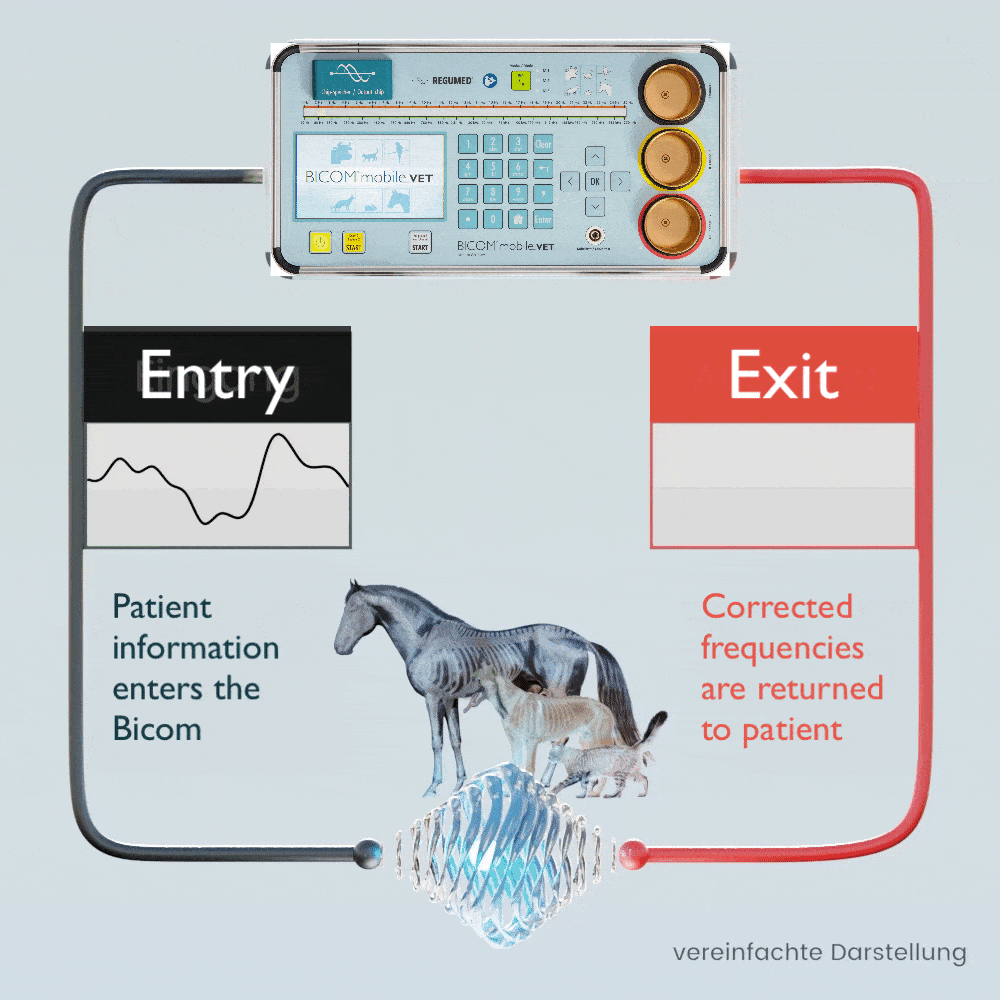
Biophysical basics of the bioresonance method
Life is only possible when three conditions are met: matter, energy and information.
We also find these aspects in conventional medicine, both in diagnostics and in therapy. For example, every drug is also a carrier of information.
Information is neither energy nor matter, it is immaterial and comparable to the meaning of a message from a sending to a receiving system.
In addition to the electrical processes in the receptor proteins and biomembranes in general, electromagnetic interactions through light (biophotons) also play a role in cell communication and the transmission of information.
Specific electromagnetic wave patterns act as information carriers. These wave patterns can be modulated by the BICOM® device in order to eliminate disturbing or stressful information in an organism.
The goal is to restore the free flow of healing information (cell communication) and thus support the self-regulation of the organism and the self-healing powers.
Individual, patient-specific information or information from native substances, digitized substances or information stored on storage media can be used for therapy.
What your colleagues are saying…

Top 10 Essential Questions to Ask Your Cat Vet for Best Care
10 Essential Questions to Ask Your Cat Vet During the First Visit
When bringing a new cat into your home, one of the most important steps is scheduling a visit to the cat vet. The first visit is crucial for establishing a healthy relationship between your cat and their vet, ensuring that your furry friend receives the best care from the start. To make the most of this initial appointment, it's essential to ask the right questions. Here are the 10 essential questions to ask your cat vet during the first visit to ensure your cat stays healthy and happy.
1. What Vaccinations Does My Cat Need?
Vaccinations are a critical part of your cat’s health care routine. During your first visit, ask your cat vet about the necessary vaccinations for your feline friend. Cats typically need vaccines against common diseases such as feline distemper, feline herpesvirus, and rabies. Your cat vet can provide a vaccination schedule tailored to your cat’s age, health status, and lifestyle. Understanding which vaccinations are essential will help protect your cat from potentially life-threatening diseases.
2. How Often Should I Bring My Cat to the Vet?
Routine check-ups are vital for maintaining your cat's health. Ask the cat vet how often you should schedule visits for your pet. Typically, vets for pets recommend annual check-ups, but this can vary depending on your cat's age, breed, and health status. For instance, kittens and senior cats may require more frequent visits. Your cat vet will provide guidance on the best schedule to keep your cat in optimal health.
3. What Type of Diet is Best for My Cat?
Diet plays a significant role in your cat's overall well-being. During your visit, ask the cat vet about the best diet for your cat’s specific needs. Cats have unique dietary requirements that differ from other pets. They are obligate carnivores, meaning their diet should be high in protein and low in carbohydrates. Your vet can recommend high-quality cat food that meets these nutritional needs and suggest portion sizes to avoid obesity. They can also advise on whether your cat needs any supplements based on its health and lifestyle.
4. What Signs of Illness Should I Watch For?
Cats are masters at hiding their discomfort. It’s important to ask your cat vet what signs of illness to watch for. Some common signs include changes in appetite, behavior, grooming habits, and litter box use. Knowing what to look for can help you detect potential health issues early, allowing for prompt treatment. Your cat vet can provide a comprehensive list of symptoms that may indicate health problems, ensuring you’re well-prepared to monitor your pet’s health at home.
5. How Can I Keep My Cat’s Teeth Healthy?
Dental health is often overlooked but is vital to your cat’s overall health. Ask the cat vet about the best ways to maintain your cat’s dental hygiene. Cats can suffer from dental diseases, which can lead to more serious health problems if left untreated. Your vet may recommend regular teeth brushing, dental treats, or professional cleanings. Understanding how to care for your cat’s teeth will help prevent dental issues and keep your pet healthy.
6. What Parasite Prevention Does My Cat Need?
Parasites such as fleas, ticks, and worms can pose serious health risks to cats. During your first visit, ask the cat vet about the necessary parasite prevention measures. Vets for pets often recommend a combination of treatments to protect against both internal and external parasites. Your vet can suggest the best products and provide guidance on how frequently they should be administered. Keeping your cat protected from parasites is essential for their health and comfort.
7. Is My Cat at a Healthy Weight?
Weight management is crucial for your cat’s health. Ask the cat vet if your cat is at a healthy weight. Obesity is a common issue in cats and can lead to serious health problems such as diabetes and joint issues. Your vet will assess your cat’s body condition and provide guidance on maintaining a healthy weight through diet and exercise. Vets for pets can offer specific recommendations tailored to your cat’s needs to ensure they stay fit and healthy.
8. Should I Spay or Neuter My Cat?
Spaying or neutering your cat is an important decision that can have long-term health benefits. During your visit, discuss with the cat vet the pros and cons of spaying or neutering. The procedure can prevent certain cancers and reduce the risk of behavioral problems. Your vet can provide information on the best time to perform the surgery and explain the potential risks and benefits. Making an informed decision about spaying or neutering will contribute to your cat’s overall well-being.
9. What Should I Do If My Cat Has Behavioral Issues?
Behavioral issues such as aggression, litter box problems, or excessive meowing can be concerning for cat owners. Ask the cat vet for advice on managing these behaviors. They can help determine whether the behavior is due to a medical issue or if it’s purely behavioral. Vets for pets often have experience in managing feline behavior and can provide tips or refer you to a specialist if needed. Understanding how to address behavioral problems can lead to a happier, more harmonious home environment.
10. How Can I Make Vet Visits Less Stressful for My Cat?
Vet visits can be stressful for cats, but there are ways to make the experience more comfortable. Ask the cat vet for tips on reducing stress during visits. They might suggest using a carrier that your cat is comfortable with, bringing familiar items such as a blanket or toy, or using calming pheromones. Vets for pets understand that a calm cat is easier to examine and treat, so they will have strategies to help make the experience as stress-free as possible.
Conclusion
Your cat’s first visit to the vet is a crucial opportunity to establish a foundation for their lifelong health care. By asking these 10 essential questions, you can ensure you’re taking the necessary steps to provide the best care for your feline friend. Always remember that regular communication with your cat vet and routine check-ups are key to maintaining your pet’s health. Vets for pets are there to help guide you in providing a happy, healthy life for your cat. Make sure to follow their advice and stay informed about your cat’s health needs. With the right care and attention, your cat will enjoy a long, healthy, and happy life.
Treatment Priorities
For gentle and optimal treatment of the causes of diseases in animals
The BICOM® bioresonance method is predestined for use with large and farm animals such as horses , but also with dogs , cats and small animals. The treatment focus of the BICOM® mobile VET is wide-ranging. It is now used for many indications.
It recognises health deficits at an early stage and is used, among other things, for the following symptoms:
sweet itch
Feed intolerances
allergies and related diseases
COB/COPD
leishmaniasis
Lyme disease
anaplasmosis
lameness in horses
hoof ulcer
Poisoning by poisoned baits, plants etc.
mauke
Feline infectious peritonitis (FIP)
Cat flu/cat disease
eye/conjunctivitis
and much more
Get advice now!
Our experts are happy to be there for you personally
Our BICOM® bioresonance experts are available to answer any questions you may have
and will be happy to advise you personally and individually.
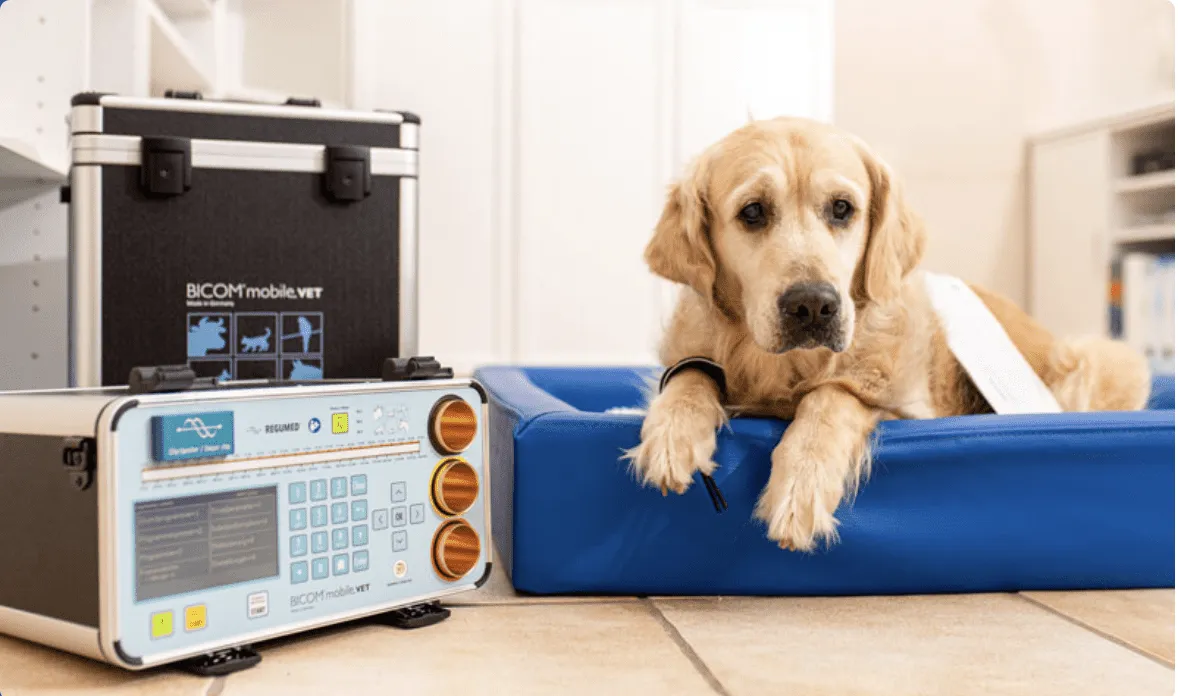
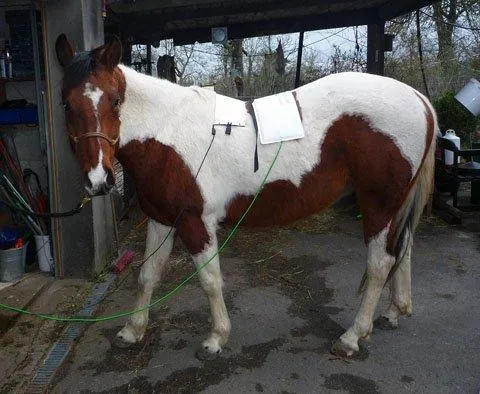

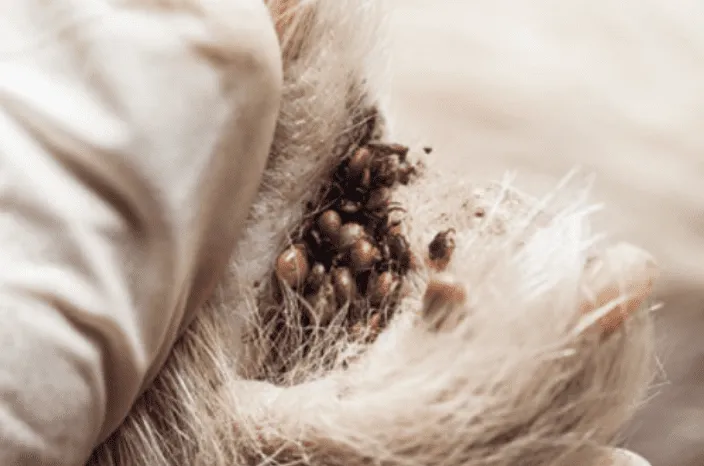
Request more information
Quick Links

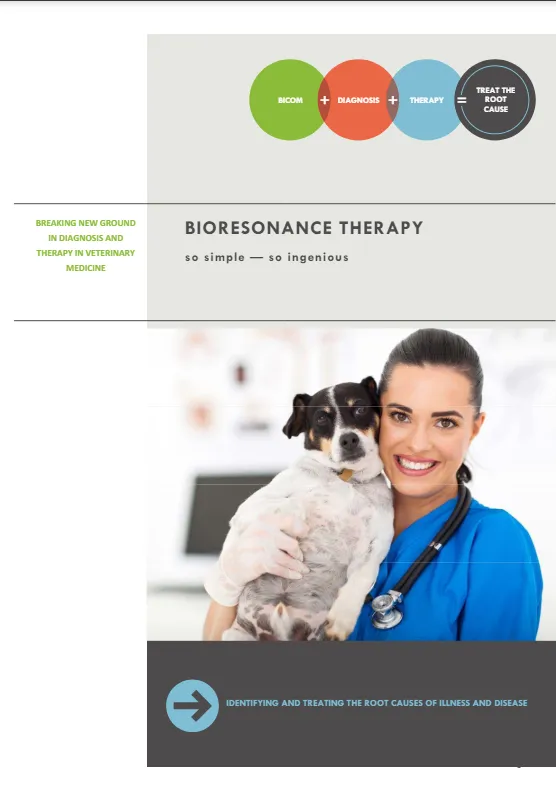
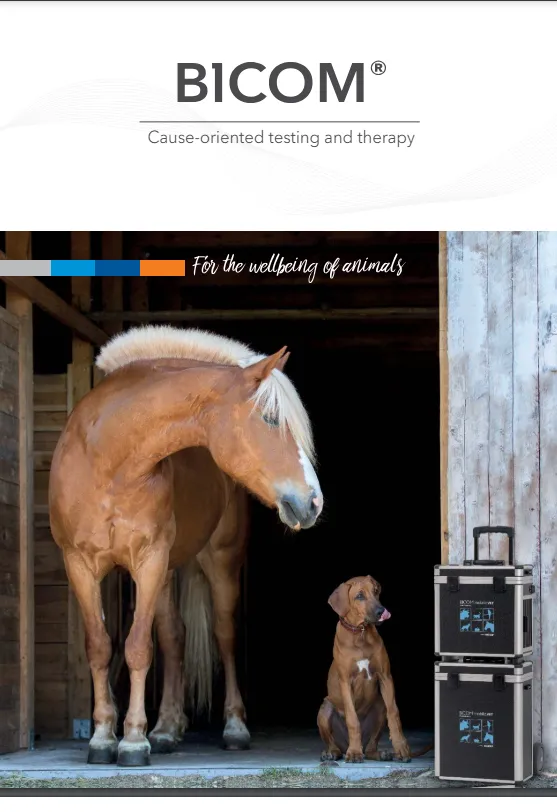


Facebook
Instagram
Mail